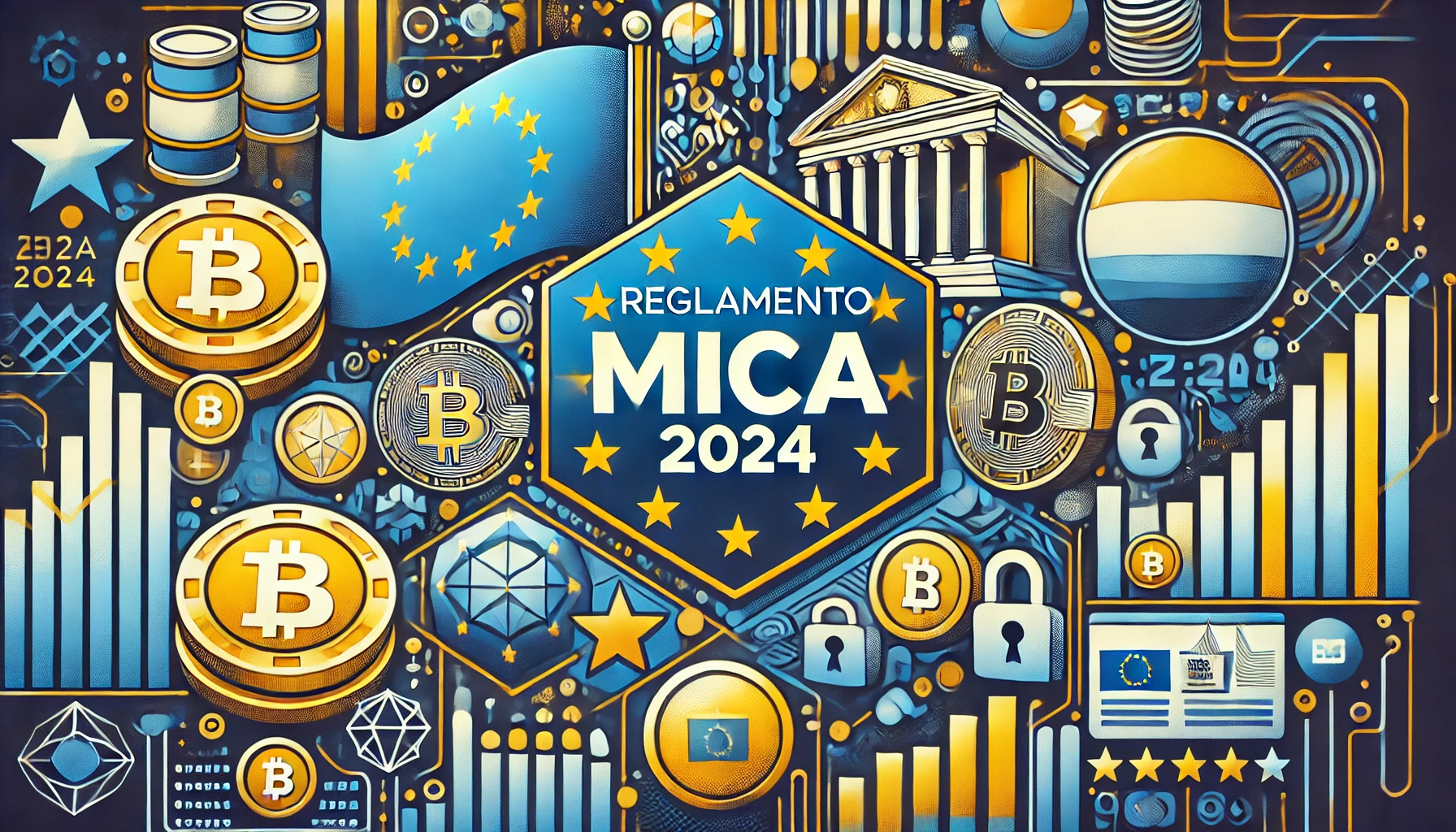Did you know that a new regulation is about to transform the cryptoasset market in Europe?
MiCA Regulation 2024 promises to bring significant changes.
Read on to find out how this regulatory framework will affect the industry and what compliance measures will need to be taken.
What is the MiCA Regulation?
The MiCA (Markets in Crypto-Assets) Regulation is a European Union legislation passed in April 2023 and will enter into force in 2024.
It aims to create a uniform regulatory framework for crypto-assets, improving legal certainty and protecting consumers.
Main Objectives of MiCA
- Consumer Protection: Safeguarding cryptoasset users against possible risks.
- Financial Stability: Mitigate potential risks to financial stability arising from the use of cryptoassets.
- Fostering Innovation: Maintaining the EU’s competitiveness in the digital financial sector.
What Does MiCA Cover and What Does It Exclude?
MiCA regulates a wide range of cryptoassets and activities, but also establishes important exclusions.
Cryptoassets Included
– Asset-Related Tokens: Cryptoassets with stable value referenced to other securities or rights.
– E-money Tokens: Cryptoassets referenced to the value of an official currency.
– Other Cryptoassets: Those not previously categorized.
Exceptions
– NFTs (Non Fungible Tokens): Excluded from initial regulation.
– Decentralized Finance (DeFi): Also excluded for now, although they could be regulated in the future.
Obligations for Cryptoasset Issuers
If you are a cryptoasset issuer, you will have to comply with several obligations to operate legally in the EU.
Authorization Requirements
– Prior Authorization: Obtain authorization from the competent authority in the Member State where you have your registered office.
– Publication of a White Paper: Document detailing the cryptoassets to be issued.
– Anti-Money Laundering Measures (AML): Implement policies and procedures to prevent money laundering and terrorist financing.
Obligations for Cryptoasset Service Providers
Service providers, such as exchanges and custody platforms, must also comply with specific requirements.
Services Covered by MiCA
– Custody and Administration of Cryptoassets.
– Trading Platforms Management.
– Exchange of Cryptoassets for Funds or Other Cryptoassets.
– Execution of Orders on behalf of Customers.
– Placement and Receipt of Orders Related to Cryptoassets.
License Requirements
– Registration and Licensing: Need to obtain a license to operate within the EU.
– Transparency and Consumer Protection: Acting with honesty and professionalism in the best interest of customers.
Impact on Stablecoins
Stablecoins will be one of the first areas to be regulated under MiCA.
This includes currencies such as Tether (USDT), USD Coin (USDC) and DAI.
Regulation of Stablecoins
– Permits and Licenses: Issuers of stablecoins must obtain permission to operate in the EU.
– Transaction Limits: Restrictions on the number of daily transactions to avoid negative impacts on financial stability.
– Foreign Currency Restrictions: Specific limits for stablecoins linked to foreign currencies, such as the U.S. dollar.
Benefits and Opportunities of the MiCA Regulation
Regulatory Clarity
MiCA provides the regulatory clarity that the cryptoasset industry has been waiting for.
This creates a safer and more regulated environment for users and businesses, promoting confidence in the market.
Innovation Promotion
With clear rules and a unified framework, the EU is positioned as an attractive place for Web3 and blockchain innovation.
This can attract startups and tech companies looking for a regulated and stable environment.
European Passport
Cryptoasset service providers will be able to operate throughout the EU with a single license, which greatly simplifies compliance and reduces costs.
Preparation for Implementation in 2024
Steps to follow for Companies
- Obtain Authorization: Request and obtain the necessary authorization from the competent authorities.
- Comply with Transparency Requirements: Ensure that all activities are documented and transparent.
- Implement Security Measures: Develop and implement security and anti-money laundering protection policies.
- Education and Training: Train employees on new requirements and procedures to comply with MiCA.
Practical Advice
– Continuous Monitoring: Keep updated with the guidelines and recommendations issued by the regulatory authorities.
– Legal Advice: Consult with legal experts to ensure full compliance with all regulations.
– Technology Adoption: Use advanced technological solutions to facilitate compliance and transparency.
Conclusion
MiCA Regulation 2024 represents a significant change for the cryptoassets industry in the European Union.
With clear objectives of consumer protection and financial stability, it provides a regulatory framework that promotes innovation and competitiveness.
Preparing adequately for its implementation is crucial for companies wishing to operate in this regulated environment and take advantage of the opportunities that MiCA brings.
For more information on the MiCA Regulation, you can consult the official sources of ESMA, the EUR-Lex and the BOE.
This article has been designed to provide you with a clear and concise understanding of the MiCA Regulation and its implications.
Get ready for 2024 and ensure your business is ready to comply with this new era of regulation in the cryptoasset world.
Would you like to receive more information or do you have any questions?
Leave a comment or schedule a meeting with our agents, we will be happy to help you.

